
Caswell Pines Golf Club Hole # 1 par 5 from the first tee. Choose your landing spot well. By Paul Liggitt
Morning comes early for folks living in the rural areas of Caswell County. At one point, the area was home to multiple dairy farms, many of them located on County Home Road that spurs off of Hwy. 86 just east of downtown Yanceyville. In 1933, Gene Hamm, PGA pro and golf course architect, left his mark by building Caswell Pines Golf Course, which has outlived most of its dairy farm neighbors.
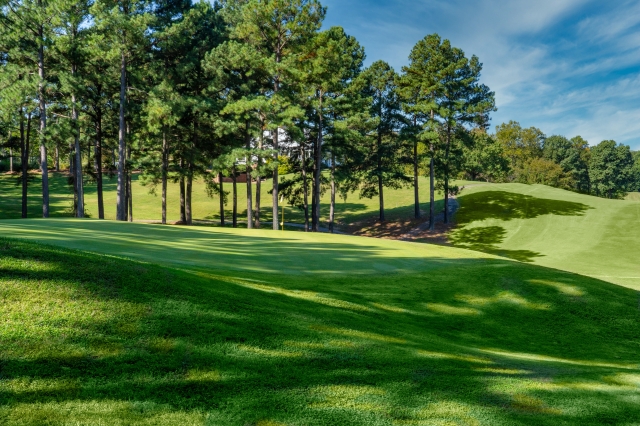
Caswell Pines is a championship par 72 golf course with Bermuda fairways and bent grass greens offering a great escape from the busyness of life. For those who enjoy the challenge of hitting a 1.25” ball across hundreds of yards of beautifully landscaped North Carolina countryside – or sometimes through semi-solid pine trees, as I do – Caswell Pines Golf Club should be on your short list of courses you plan to visit. You won’t hear the dairy cows mooing, but you will appreciate the tranquility and beauty as the sun makes its way over the course during your round. You will not be disappointed.
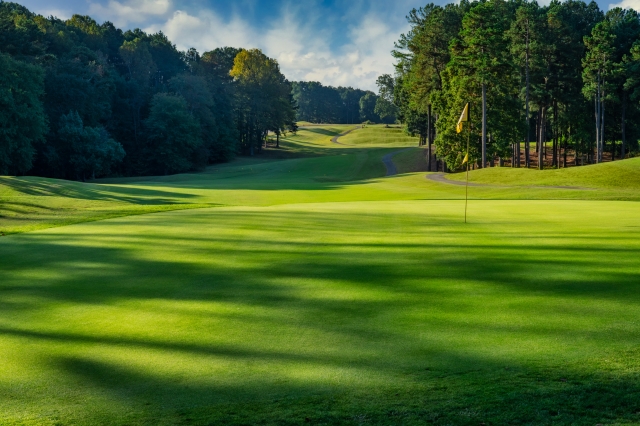
Located on 156 acres, Caswell Pines is a semi-private golf club that is open 363 days a year and is the only golf course in Caswell County, just a little over two miles off Hwy. 86. You can book your tee time online, and rates are competitive with other regional courses. Seasonal adjustments for late play, seniors, walkers, and those who just need an emergency nine to get their golf fix are all available. The course features an 11,000-square-foot practice putting green, complete with a practice bunker, that I always regret not spending more time in, and a 3.5-acre driving range with real grass tees. The pro shop is not the PGA Superstore, but has most things that any golfer may need. At the turn, you can get a sandwich at the grill or meet your pals for a non-golf lunch in the spacious restaurant.
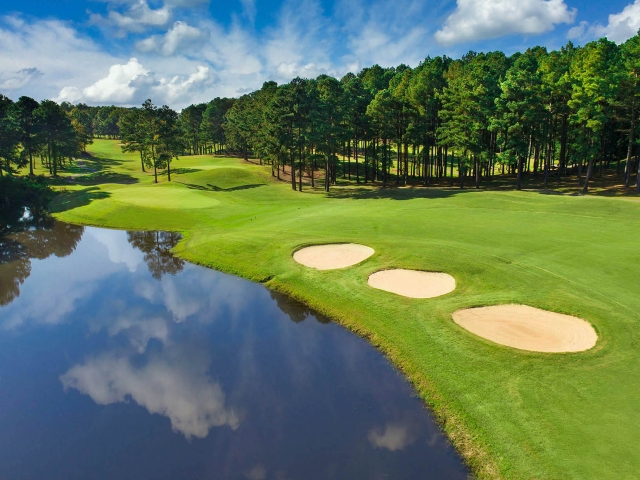
Robbie Greear is the vice president of operations for Greear Properties that owns and manages Caswell Pines, along with four other semi-private golf courses in Virginia and North Carolina. Robbie has been on-site since January of 2016, working on course development and improvement. He was quick to comment that one is “never really done with this masterpiece.” In addition, he said, “We always have an ear out for every customer we deal with,” regarding improvements and issues with the course. Gary Selders is the general manager, and there is a staff of 19 that includes pro shop personnel, cart techs, grounds crew, and restaurant staff. Robbie’s father, Bob Greear, decided to transition from his previous business ventures to golf course ownership in 2014, and Caswell Pines was the second of the five properties ultimately purchased. One thing that sets Caswell Pines apart from the company’s other golf properties is that Greear Properties has 15 real estate lots to develop around the course, ranging from three-quarters of an acre to two and one-fourth acres.
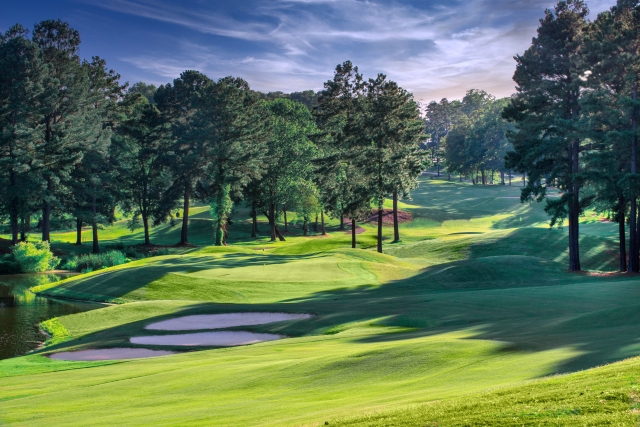
Robbie’s parents have enjoyed golf their entire life and instilled Robbie’s love of the game at an early age. For Bob Greear, obtaining the golf course properties was “doing something he really wanted to do.” Robbie is a 6.6 handicap, which means he is a really good amateur. Therefore, he can appreciate the balance needed when grooming a top-notch course for a wide range of golfers, so all can find enjoyment and value no matter their skill level. Robbie said that Caswell Pines is a challenging course. Hamm’s philosophy was to make fairways a little narrower, remove as few trees as possible, and capitalize on the natural topography presented to him by removing as little dirt as possible during construction. Robbie said, “I don’t know of another golf course that fits the topography of the grounds like this one. Through the process of bringing back the golf course, the mystique of the course has begun to show itself in the past few years.” As a photographer and golfer, I know and understand his comments. While playing at Caswell, the views the golfer is presented with during different times of the day are eye-catching and picturesque, to say the least. It may be why Robbie and the crew are so dedicated to doing justice to Hamm’s design, making the course all that it can be aesthetically, and to preserving the “shot value” intended for the golfer.

“Shot value” is a term Robbie uses regularly and for the casual golfer it may be hard to grasp. Basically, the value of a shot is made up by taking into account all of the factors that go into deciding which shot to make – or attempt to make. Your target, your lie, the turf, weather conditions, the topography, and obstructions all contribute to the “shot value.” More to consider means a higher shot value. You simply can’t or probably shouldn’t hit a driver off every tee or expect to hit a low runner to every green.
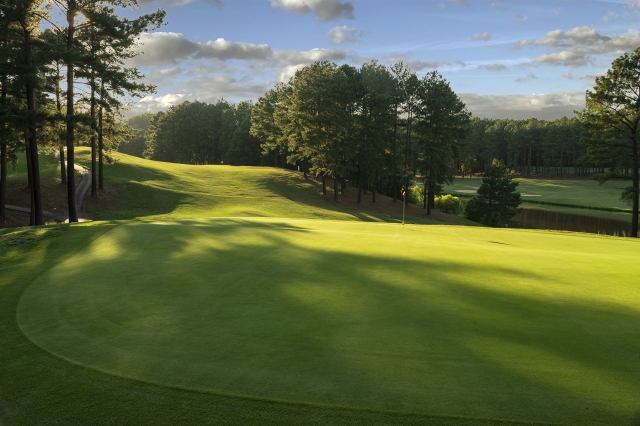
Caswell Pines is a golf club first, but it is also a community member. It’s a place for fundraising, a host for schools to practice and compete, and is a quality golf venue for whatever group visits. The course currently has five sets of tees that go from 6,700 yards at the “tips” but are evaluating to see if other teeing grounds are warranted to make the course more playable for different populations. Part of Robbie’s vision for Caswell Pines is to expand the practice facility to include a short game practice area. With help from the United States Golf Association (USGA) and outside contracted agronomic firms, they strive to maintain the best turf and green conditions possible. For the golf nerds, the greens run between 9 and 11 on the Stimpmeter and the Carolina Golf Association has given the course a 69.8 slope rating.
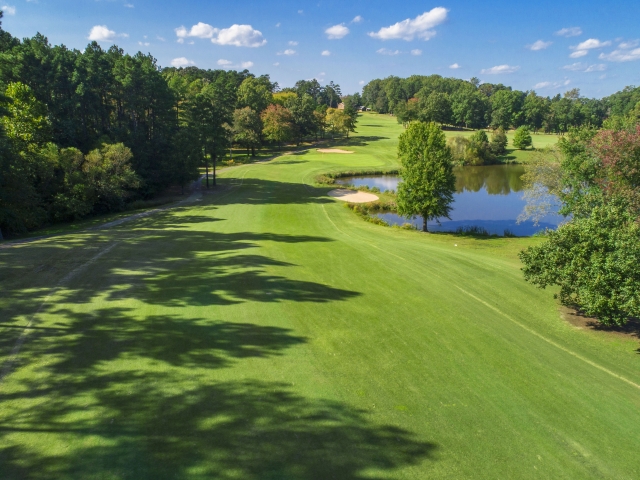
As one can imagine, the challenges of operating a golf course are enormous, with weather being number one on the list of factors. Some rain, no rain, too much rain, not enough rain, rain at the wrong time, or rain on the wrong place on the course are all factors. And when the course is called Caswell Pines, there are also a lot of pine trees, so wind and storms tend to affect it as well. After weather issues, the logistics and mechanical maintenance of managing the property can occupy up to 70 percent of man-hours and resources. Eight miles of underground PVC pipe and sixteen miles of cabling feeding the hundreds of sprinkler heads keep Robbie wearing many hats, so he values his cross-trained grounds crew and says he is fortunate to have crew members who can get the job done.
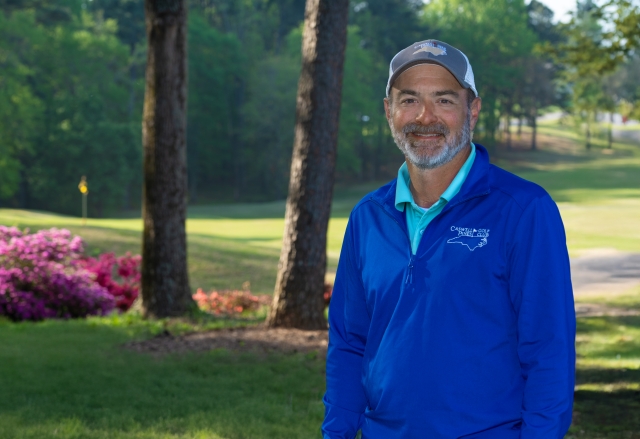
For the amateur golfer, it is not really about the score. Everyone wants to play well; but Robbie recalls the fact that making new friends is the most rewarding part of his role at Caswell Pines. He takes a lot of pride in the product and hopes that the patrons will help take care of this somewhat fragile venue called Caswell Pines Golf Club. Simple things like repairing ball marks, raking bunkers after use, and respecting the others on the course help make it enjoyable for all those who come after you.
Robbie said the most fun and the biggest laughs he has had over the years have all been centered around his golf experiences. He said is grateful to be in the Caswell County community and is dedicated to always improving Caswell Pines Golf Club, the county’s most enjoyable golf venue and the perfect choice for a nearby golf escape.
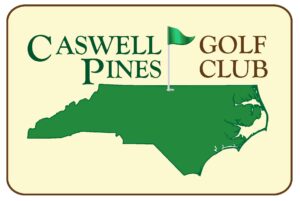
2380 County Home Rd.
Yanceyville, NC, 27379
336-694-2255
CaswellPines.com
